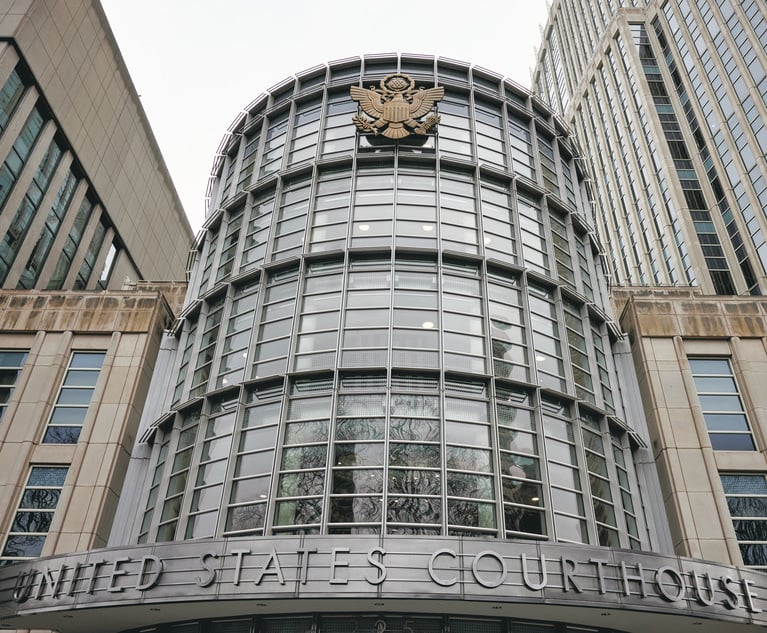Designing a Coupon Settlement to Maximize Its Value
Thomas A. Dickerson writes: Although subject to criticism, there are occasions when a non-cash settlement of coupons, in whole or in part, for the purchase of good and services from the defendant may be appropriate. The courts must be particularly careful and make certain that a proposed coupon settlement is nearly as good as a cash settlement as possible.
June 30, 2017 at 01:04 PM
8 minute read
Although subject to criticism, there are occasions when a non-cash settlement of coupons, in whole or in part, for the purchase of good and services from the defendant may be appropriate. See Thomas A. Dickerson, “Class Actions: The Law of 50 States,” Law Journal Press, Ch. 9 (Non-Cash Settlements) (2017); see also Williamson v. McAfee, 2017 U.S. Dist. LEXIS 15838 (N.D. Cal. 2017) ($11.50 “value certificate”; class could receive $11.50 in cash if completed form); Chambers v. Whirlpool, 2016 U.S. Dist. LEXIS 140839 (C.D. Cal. 2016) (“a full recovery of costs spent on repairs; $200 to $300 in cash for class members who replaced their dishwashers; $100 or a 30 percent rebate on the purchase of a new dishwasher; for class members who experienced an overheating event in the future; a rebate of 10 to 15 percent on the purchase of a new dishwasher to all class members); Redman v. Radioshack, 768 F.3d 622 (7th Cir. 20154) ($10.00 coupon; if purchase item costing less than $10.00 no change; transferable and cash convertible).
The reasons for allowing coupon settlements include: (1) recovery of de minimus damages (which makes the cost of distribution of each individual's cash award higher than that individual's claim); (2) the inability to identify class members; (3) the defendant's inability to pay cash to the class; or (4) it makes good business sense from the standpoint of both the consumer and defendant. Since coupon settlements are generally worth less to consumer than cash, they must be carefully examined for adequacy. Yet coupon settlements are justified because they solve manageability problems, may reflect the defendant's financial instability and require a defendant to disgorge improperly obtained monies. The courts must be particularly careful and make certain that a proposed coupon settlement is nearly as good as a cash settlement as possible.
As noted by Justice Richard Posner in Redman: “The judge asked to approve the settlement of a class action is not to assume the passive role that is appropriate when there is genuine adverseness between the parties … . Critically the judge must assess the value of the settlement of the class and the reasonable of the agreed upon attorneys' fees for class counsel.”
This content has been archived. It is available through our partners, LexisNexis® and Bloomberg Law.
To view this content, please continue to their sites.
Not a Lexis Subscriber?
Subscribe Now
Not a Bloomberg Law Subscriber?
Subscribe Now
NOT FOR REPRINT
© 2025 ALM Global, LLC, All Rights Reserved. Request academic re-use from www.copyright.com. All other uses, submit a request to [email protected]. For more information visit Asset & Logo Licensing.
You Might Like
View All
Big Tech and Internet Companies Slammed With Consumer Class Actions in December

GE Agrees to $362.5M Deal to End Shareholder Claims Over Power, Insurance Risks
2 minute read
'No Evidence'?: Big Law Firms Defend Academic Publishers in EDNY Antitrust Case
3 minute read
'Substantive Deficiencies': Judge Grants Big Law Motion Dismissing Ivy League Price-Fixing Claims
3 minute readTrending Stories
- 1In-House Lawyers Are Focused on Employment and Cybersecurity Disputes, But Looking Out for Conflict Over AI
- 2A Simple 'Trial Lawyer' Goes to the Supreme Court
- 3Clifford Chance Adds Skadden Rainmaker in London
- 4Latham, Kirkland and Paul Weiss Climb UK M&A Rankings
- 5Goodwin Hires Quinn Emanuel Partner to Launch Office in Brussels
Who Got The Work
J. Brugh Lower of Gibbons has entered an appearance for industrial equipment supplier Devco Corporation in a pending trademark infringement lawsuit. The suit, accusing the defendant of selling knock-off Graco products, was filed Dec. 18 in New Jersey District Court by Rivkin Radler on behalf of Graco Inc. and Graco Minnesota. The case, assigned to U.S. District Judge Zahid N. Quraishi, is 3:24-cv-11294, Graco Inc. et al v. Devco Corporation.
Who Got The Work
Rebecca Maller-Stein and Kent A. Yalowitz of Arnold & Porter Kaye Scholer have entered their appearances for Hanaco Venture Capital and its executives, Lior Prosor and David Frankel, in a pending securities lawsuit. The action, filed on Dec. 24 in New York Southern District Court by Zell, Aron & Co. on behalf of Goldeneye Advisors, accuses the defendants of negligently and fraudulently managing the plaintiff's $1 million investment. The case, assigned to U.S. District Judge Vernon S. Broderick, is 1:24-cv-09918, Goldeneye Advisors, LLC v. Hanaco Venture Capital, Ltd. et al.
Who Got The Work
Attorneys from A&O Shearman has stepped in as defense counsel for Toronto-Dominion Bank and other defendants in a pending securities class action. The suit, filed Dec. 11 in New York Southern District Court by Bleichmar Fonti & Auld, accuses the defendants of concealing the bank's 'pervasive' deficiencies in regards to its compliance with the Bank Secrecy Act and the quality of its anti-money laundering controls. The case, assigned to U.S. District Judge Arun Subramanian, is 1:24-cv-09445, Gonzalez v. The Toronto-Dominion Bank et al.
Who Got The Work
Crown Castle International, a Pennsylvania company providing shared communications infrastructure, has turned to Luke D. Wolf of Gordon Rees Scully Mansukhani to fend off a pending breach-of-contract lawsuit. The court action, filed Nov. 25 in Michigan Eastern District Court by Hooper Hathaway PC on behalf of The Town Residences LLC, accuses Crown Castle of failing to transfer approximately $30,000 in utility payments from T-Mobile in breach of a roof-top lease and assignment agreement. The case, assigned to U.S. District Judge Susan K. Declercq, is 2:24-cv-13131, The Town Residences LLC v. T-Mobile US, Inc. et al.
Who Got The Work
Wilfred P. Coronato and Daniel M. Schwartz of McCarter & English have stepped in as defense counsel to Electrolux Home Products Inc. in a pending product liability lawsuit. The court action, filed Nov. 26 in New York Eastern District Court by Poulos Lopiccolo PC and Nagel Rice LLP on behalf of David Stern, alleges that the defendant's refrigerators’ drawers and shelving repeatedly break and fall apart within months after purchase. The case, assigned to U.S. District Judge Joan M. Azrack, is 2:24-cv-08204, Stern v. Electrolux Home Products, Inc.
Featured Firms
Law Offices of Gary Martin Hays & Associates, P.C.
(470) 294-1674
Law Offices of Mark E. Salomone
(857) 444-6468
Smith & Hassler
(713) 739-1250






